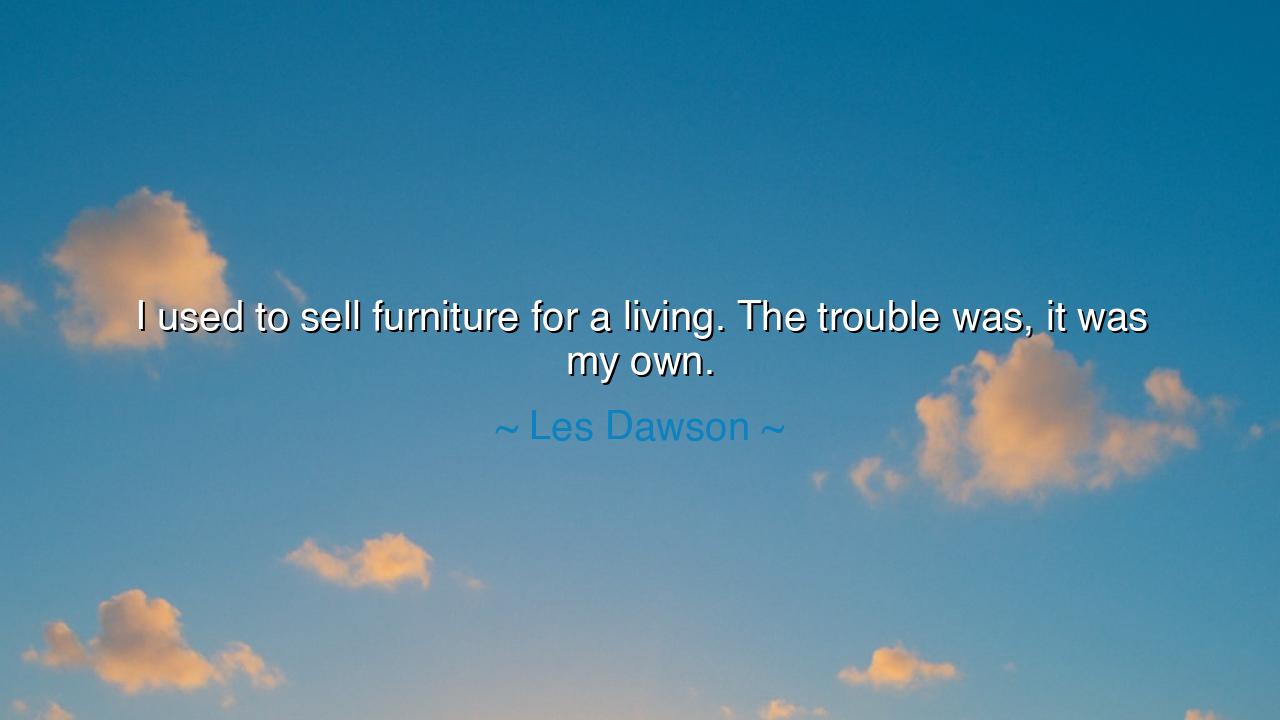
I used to sell furniture for a living. The trouble was, it was my






Hear, O children of the earth, the words of Les Dawson, a man who spoke not only in jest but with a wisdom that resonates through the ages: "I used to sell furniture for a living. The trouble was, it was my own." This seemingly lighthearted remark contains within it a profound reflection on the human condition, the choices we make, and the consequences of self-reliance. To truly understand the weight of these words, we must look beyond the surface and see the deeper truth they reveal about the nature of work, ownership, and the struggle for balance.
In the ancient texts, it is said that life is a dance between creation and destruction, a constant ebb and flow of giving and taking. To build something, be it a house, a business, or a life, is to imbue it with purpose—and yet, to sell it is to separate oneself from that purpose, to relinquish what was once yours and cast it into the hands of others. The tale Les Dawson shares with us is not just one of selling furniture, but of selling oneself, of being caught in the cycle of creating and discarding, and finding that in the end, what you have made may be the very thing that holds you back. His furniture represents his own labor, his time, his essence—and in selling it, he is faced with the irony of the act: to let go of what is his, yet remain bound to it by the very nature of his work.
The story of the ancient craftsman comes to mind. In times long past, there were artisans who would pour their heart and soul into their creations—be it pottery, sculptures, or tapestries. But to sell their work was to let it go, to part with their legacy, their art. Once it left their hands, it was no longer theirs to control, and often, the buyer would display it in ways the artist could never have imagined. The craftsman was caught in a struggle—what did he truly own? The work of his hands, or the freedom to sell it and move forward in his life? The craftsman, like Dawson, was bound by his own creations, and this paradox formed the very heart of his struggle.
Les Dawson's words speak to the tension that exists within each of us: we are creators, builders, and dreamers, but we are also salesmen, traders in our own labor. The furniture that Dawson refers to is not just a physical object; it is a symbol of what we invest in the world—our time, energy, and vision. When we sell these things, do we not, in some sense, sell pieces of ourselves? The trouble, as Dawson puts it, is that we often do not realize how deeply we are tied to the things we create, how the very act of selling can leave us empty, searching for meaning in the exchange.
Consider the example of the great philosophers and writers of antiquity—Socrates, who spoke often of the danger of becoming too attached to material wealth, and Plato, who wrote that true wisdom cannot be bought or sold, for it lies not in possessions, but in the soul's pursuit of truth. These men were not immune to the desire to create or exchange, but they understood that true value was found not in ownership, but in purpose and connection. Like Dawson, they would have known the dilemma of giving up what they had created, yet they sought a higher path—one where their worth was not defined by what they sold, but by what they shared with the world.
The lesson Dawson imparts, O children of the earth, is one of awareness. We must ask ourselves, in our pursuits, whether we are merely selling off our own essence, trading pieces of ourselves for fleeting rewards, or whether we are creating with purpose and integrity. To build is noble, but to understand the true cost of that building—what we must give up in the process—is essential to our growth. Do not fall prey to the temptation to sell your creations in a way that leaves you empty. Rather, strive to build with intention, to give without regret, and to understand that what you create in this life is part of your legacy, not merely a commodity to be exchanged.
In your own life, O seekers of wisdom, be mindful of what you create and how you share it with the world. Own your creations, but do not become bound by them. Sell your work when necessary, but never forget the purpose behind it, and always seek to build in a way that adds value to your life and the lives of others. Let each piece of work you create be a reflection of your soul, not just an object for exchange. In this way, you will walk the path of the true creator, never losing sight of the meaning behind what you build.






AAdministratorAdministrator
Welcome, honored guests. Please leave a comment, we will respond soon